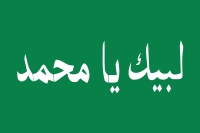Promised Day Brigade
| Promised Day Brigade (PDB) | |
|---|---|
| Participant in the Iraq War | |
|
Flag of the Promised Day Brigade | |
| Active | November 2008–June 2014 |
| Leaders | Muqtada al-Sadr |
| Headquarters | Sadr City, Baghdad |
| Area of operations | Iraq and Syria |
| Strength |
15,000 (2008)[1] 5,000 (2011)[2] |
| Part of |
|
| Originated as | Mahdi Army |
| Became | Peace Companies |
| Allies |
|
| Opponents |
|
| Battles and wars |
Iraq War Syrian Civil War |
The Promised Day Brigade (PDB) (Arabic: لواء اليوم الموعود Liwa al-Youm al-Mawud), originally called the Muqawimun (Arabic: المقاومون; Resisters)[3] was a Shi'a organization and was an insurgent group operating in Iraq during the war. In 2010 it was one of the largest and most powerful of what the US military call "Special Groups" in Iraq.[4] The group was created as successor to Muqtada al-Sadr's Mahdi Army, which was Iraq's largest Shi'a militia until its disbanding in 2008, he also called on other Special Groups to join the brigade. Sadr had earlier already talked about the creation of a smaller guerrilla unit which would continue the Mahdi Army's armed activities but for the first time gave the organisation a name in November 2008 when he declared the creation of the Promised Day Brigade.[5] Its activities have particularly increased since May 2009.[3] The group is alleged to receive Iranian support. A crackdown against the group in end 2009 led to the arrest of 18 of its members including several commanders.[6] On November 29, 2009, the group's Basra leader was arrested in al-Amarah.[7]
In October 2009 the Promised Day Brigade fought a battle with rival Special Group Asa'ib Ahl al-Haq for influence in Sadr City. The Promised Day Brigade reportedly won the battle and even managed to destroy the house of Abdul Hadi al-Darraji, a senior Asa'ib Ahl al-Haq leader. Since then the PDB has been the most powerful Special Group in the ex-Mahdi Army stronghold of Sadr City and has increased its activity there.[8]
On July 21, 2010 General Ray Odierno said Iran supports three Shiite groups in Iraq that had attempted to attack US bases:[9] US officials believe that of these three groups, the Promised Day Brigades poses the greatest threat to Iraq's long-term security.[2]
- the Promised Day Brigades
- Ketaib Hezbollah (Hezbollah Brigades)
- Asaib Ahl al-Haq (League of the Righteous)
See also
References
- ↑ Daniel Cassman. "Mahdi Army". Retrieved November 7, 2014.
- 1 2 "US officials name 3 Iraqi militias armed by Iran to kill Yanks". Retrieved November 7, 2014.
- 1 2 Page 29
- ↑ Londoño, Ernesto; DeYoung, Karen (July 18, 2009). "U.S. Commanders Are Concerned About New Iraqi Restrictions on American Troops". The Washington Post. Retrieved May 22, 2010.
- ↑ http://www.zimbio.com/War+in+Iraq/articles/3427/Iraq+Promised+Day+Brigade+reforming+Shiite
- ↑ http://www.defenddemocracy.com/index.php?option=com_content&task=view&id=11787517&Itemid=361
- ↑ "Suspected armed group leader arrested in Missan". Retrieved November 7, 2014.
- ↑ "Can Iraq's Sadrists prove their nationalist credentials?". openDemocracy. Retrieved November 7, 2014.
- ↑ https://www.google.com/hostednews/afp/article/ALeqM5jCA6iGhsEI3i-z4hAG8Z2Cu4kV3Q
